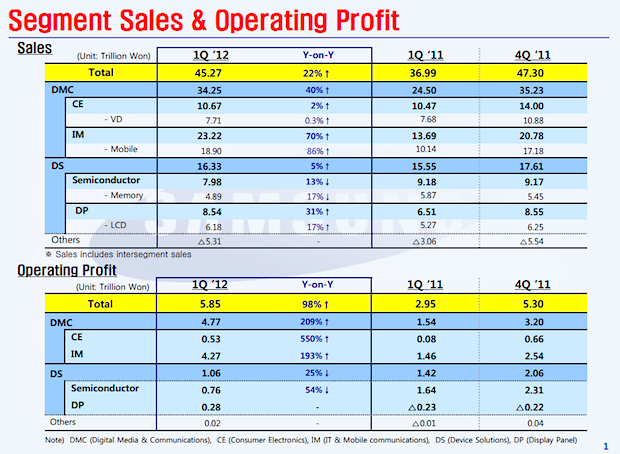Samsung's record Q1: By the numbers

Samsung's record first-quarter paid off as the company's profit jumped by over 80 percent from the previous year to $4.46 billion.

While Samsung and Apple remain staunch rivals in the mobile space --- the two still engaged in an acrimonious battle over patents --- Samsung seemingly took the crown as the smartphone leader. All Apple could do was watch as Samsung's Galaxy phones stole the hearts and minds of consumers, leaving the iPhone very much in second place, according to Strategy Analytics.
Out of that, 44.5 million Samsung smartphones gave the company a 30.5 percent of the smartphone market, while Apple's sales set at 35.1 million, giving it a 24.1 percent share.
The analytics firm said Samsung also took over Nokia as the world's number one cellphone maker, selling 93.5 million handsets in the January--March quarter.
As Reuters reports, Samsung sold over 20,000 Galaxy smartphones per hour in January--March. Apple came close, and even with a greater spread of iPhone devices, not limiting sales to the latest iPhone 4S but including the iPhone 4 and 3GS to add variety to its range, it still fell short by 9 percentage points.
But nobody can quite agree on the numbers.
IHS iSuppli puts Apple at the top of the smartphone game, with Samsung coming in first in handset sales. Apple shipped 35 million smartphones in the first quarter while Samsung only shipped 32 million, according to the research company.
Samsung's operating margins jumped to 18.4 percent from 12 percent from the last quarter thanks to strong sales of the Galaxy S, and the hybrid Galaxy Note, which is either a large phone or a tiny tablet --- take your pick --- pushed Samsung into its record breaking first-quarter.
The Korea-based company took $4.45 billion in net profit and generated $39.8 billion in sales. It accounted $5.2 billion in operating profit.
But Samsung is not limited to its smartphone and handset business. Semiconductor sales more than halved to $669 million. As mobile processor demand grew, Samsung shifted its operations to convert a NAND memory chip line to accommodate the shift in the market. The company said PC demand has weakened despite a price competition battle in the mobile DRAM market.
Samsung's TV business profit grew to $467 million from $70 million a year ago, helped by high-end models of flat-screen and Internet-enabled televisions. Samsung noted that demand remained steady for tablets but fell short in televisions due to lack of "seasonal demand". It wants to pick up the pace during the Olympics and the back-to-school period later this year.
Image credit: Samsung.
Related: